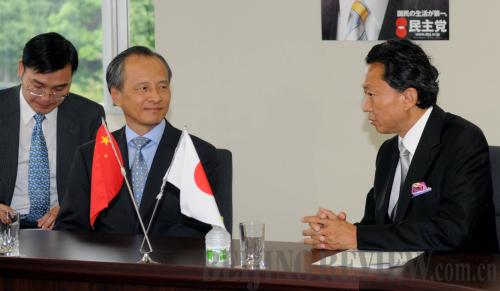|
|
 |
|
MEETING BETWEEN NATIONS: Cui Tiankai (center) meets with Japanese Prime Minister Yukio Hatoyama in Tokyo in September 2009 (LIU ZAN) |
A major reshuffling of the provincial heads of the Communist Party of China (CPC) and ministerial-level government officials happened at the end of 2009 and in early 2010. The change in ministerial- and provincial-level cadres in the middle of two CPC national congresses, like the one in December 2004 between the 16th and 17th CPC national congresses, is becoming routine. The CPC National Congress is held once every five years. The latest round features the appointment of female cadres to key posts and the exchange of local government officials and Central Government officials.
New vice ministers
The State Council announced the appointment of seven officials, including three vice foreign ministers, on January 4, the first workday after the New Year holiday.
Chinese Ambassador to Japan Cui Tiankai, Ambassador to the UK Fu Ying and Assistant Foreign Minister Zhai Jun were promoted to vice ministers of Foreign Affairs. Luo Liming was appointed deputy director of the State Ethnic Affairs Commission. Sun Yibiao was appointed vice minister of the General Administration of Customs. Wang Zhongwei and Dong Yunhu were appointed vice ministers of the State Council Information Office. The State Council also ended Liu Yanhua's term as vice minister of Science and Technology, Zhang Qiong's term as deputy director of the State Council Legislative Affairs Office as well as the terms of He Yafei and Wu Dawei as vice foreign ministers.
On January 12, Luo Huining was appointed as acting governor of northwest China's Qinghai Province during a session of the standing committee of the local people's congress. Luo, 55, took over the post from Song Xiuyan, who was elected to become vice president of the All-China Women's Federation on January 13.
On December 31, 2009, the Ministry of Finance also promoted Hu Jinglin and Wang Bao'an to the position of assistant ministers.
Mao Shoulong, a professor at Renmin University of China's School of Public Administration, told China Newsweek that the overhaul is a testament to reforms in the government personnel system that removes cadres who have reached retirement age and allows for the promotion of young talent.
The Outline on Deepening Leadership's Personnel System Reform, a document issued by the CPC Central Committee General Office in 2000, stated that Party cadres and government officials should be younger, more learned and possess more professional knowledge. The document also abolished lifelong leadership posts and suggested improving the retirement system for officials.
According to birth dates on their resumes, Liu will turn 60 in a few months and Wu and Zhang have already reached 60. Their replacements are younger and better educated. For example, Vice Minister Sun of the General Administration of Customs has a doctorate in management and was a professor at Shanghai Jiao Tong University. Dong Yunhu, the newly appointed vice minister of the State Council Information Office, was formerly a professor of the Party School of the CPC Central Committee. The two new assistant finance ministers are both below the age of 50 and hold doctorates in economics.
"In China, the leadership is appointed and candidates' educational background, experience and age are gauged during promotion," Mao said. "Under such a system, senior Party cadres and government officials are usually older than their junior counterparts. If officials are nominated and elected, there should be less of an age boundary and people will obtain their posts based on their expertise and management capacities."
Li Yuanchao, head of the Organization Department of the CPC Central Committee, said during a national meeting in November last year that leadership selection should become more efficient and focus on "appointing the most excellent officials to vital leadership posts."
A new outline for reforming the leadership personnel system between 2010 and 2020 was issued in December 2009 and updated the 2000 outline. It prioritizes the establishment of standard nomination and appointment procedures for leadership positions.
| 